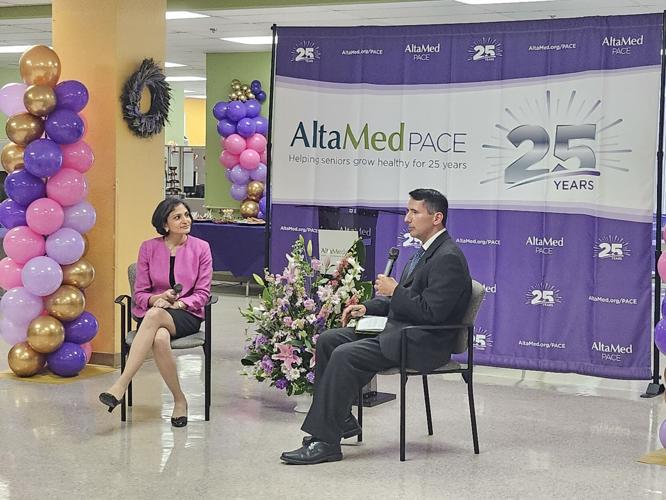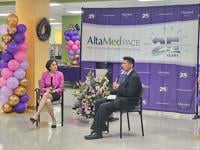
Dr. Meena Seshamani and Dr. Esiquio Casillas during the fireside chat. (Jacqueline Garcia)
On Monday afternoon, Teresa Rodriguez, 73, was among a group of participants who joined a fireside chat at AltaMed PACE - Grand Plaza in downtown Los Angeles to hear about the changes and enhancements of the Inflation Reduction Act.
The law, signed by President Biden in 2022, provides crucial financial relief for millions of seniors with Medicare through expanding benefits, lowering drug costs and strengthening Medicare over time.
Town hall participants learned about significant Medicare redesign changes making health care more affordable. Representatives from Medicare, the federal health insurance for people 65 and older, and AltaMed, a community health network, explained in detail the new initiatives, including free vaccines for certain senior conditions and medication assistance programs.
Rodriguez, a participant in the AltaMed Program for All Inclusive Care for the Elderly (PACE) since 2017, said she has been receiving high-quality health care and that her experience has always been positive. Rodriguez, who receives services at AltaMed PACE - Grand Plaza, said she had replacement surgery in both knees and has been able to receive post-surgery treatment as well as the treatment of her blood pressure, gastritis, ulcer and anxiety.
“Everything they offer [in PACE] is very important for me … the transportation, the food, the doctors, the therapists and the conversations like today to keep us informed,” she said in Spanish. “Today I learned a lot.”
The first aspect of the Inflation Reduction Act also includes a $35 insulin copay cap and $0 vaccine that went into effect on January 1st, 2023. On January 1st, 2024, Medicare expanded “Extra Help,” the financial assistance program for prescription drugs. This also capped how much people pay out of pocket on their prescription drugs when they hit a catastrophic phase of their drug plan. And by January 1st, 2025, the $2,000 out of pocket cap goes into play. This means people with Medicare Part D won’t pay more than $2,000 in a calendar year for covered prescription drugs. Medicare Part A provides hospital coverage, Part B includes outpatient care, Part C is an alternate way to receive benefits, and Part D is prescription drug coverage.

Additionally, Medicare is negotiating the pricing of the 10 drugs most used by seniors.
“This is a huge financial relief because our seniors a lot of times are on fixed income,” Deputy Administrator and Director of the Center for Medicare Dr. Meena Seshamani said.
Seshamani travels all over the country informing seniors about these changes and listening to their comments of what’s working and what needs improvement in Medicare.
“Now we are supporting caregivers; we are paying for community health services like food, housing, nutrition, care navigation,” she said, adding that it is equally important to reach out to communities of color and minorities in their own language.
Senior Vice President and Chief Medical Officer for PACE and Senior Services at AltaMed, Dr. Esiquio Casillas, said some of the changes provided by Medicare are already happening at the AltaMed PACE programs.
“Our seniors pay nothing, they don’t have copays, there is no cost at all for medications. That is an immediate benefit when they enroll versus other programs,” said Casillas. “We like to see some of these programs evolving to some of the integrated nature that PACE already does.”.
For AltaMed PACE, founded in 1996 and currently serving nearly 5,000 members in its 15 centers in Los Angeles and Orange counties, it is important for federal government leaders to reach out to the community and hear their concerns directly.
“One of the most important things in the way that we provide care is in language because that can’t be replaced,” said Berenice Constant, senior vice president of government relations and external affairs with AltaMed. “If someone doesn’t have access to a doctor, a provider or caregiver that understands them, do they really have access to care? No, right? Because of [the] language barrier, so we make that central when providing care to our community.”
United States of Care CEO Natalie Davis was at the town hall and said that as an advocate for people policy and politics, they listen to the voice of patients and eventually let leaders in capitals across the country and the federal government know of these patients’ questions and concerns.
Davis said that the voices of minorities are especially important because they are a growing population, and it is essential to consider their cultural needs when developing new policies.
“This will help us meet those that need a better health care system,” she said. “It is amazing to see programs like the PACE program really centered, and the great work that AltaMed does.”
Rodriguez said she’s a testament to how well government money can be spent if it is included in the right programs, such as Medicare.
“I’m very grateful to AltaMed. I have seen the positive changes that have happened to me since I started coming here,” said Rodriguez. “The treatment with doctors and therapists has been excellent. Most of them speak Spanish, and if they don’t, they bring me an interpreter.”













(0) comments
Welcome to the discussion.
Log In
Keep it Clean. Please avoid obscene, vulgar, lewd, racist or sexually-oriented language.
PLEASE TURN OFF YOUR CAPS LOCK.
Don't Threaten. Threats of harming another person will not be tolerated.
Be Truthful. Don't knowingly lie about anyone or anything.
Be Nice. No racism, sexism or any sort of -ism that is degrading to another person.
Be Proactive. Use the 'Report' link on each comment to let us know of abusive posts.
Share with Us. We'd love to hear eyewitness accounts, the history behind an article.